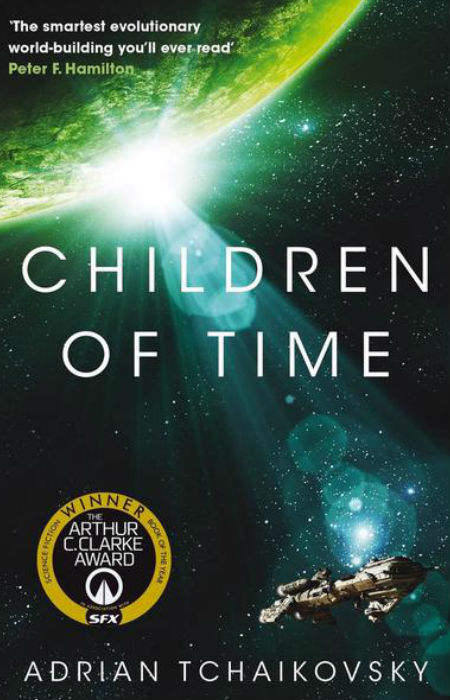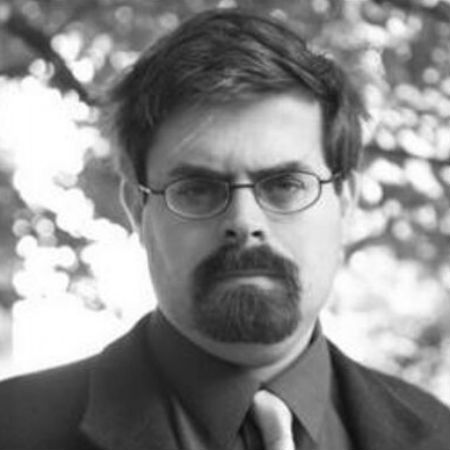
If there is a creed for science fiction, and no doubt someone somewhere has attempted one since people, most people anyway, tend to love immutable rules, it must surely be to (a) to be expansively imaginative and (b) weave in penetratingly substantial examination of the contrarily complex nature of humanity.
If this creed exists, then Adrian Tchaikovsky must surely have swallowed it whole, so effortlessly and masterfully does he manage to observe the two central tenets in his exemplary 2015 novel The Children of Time (the first in the Children of Time series which now includes Children of Ruin, published 2019).
The winner of The Arthur C. Clarke Award for 2016, Children of Time is a staggeringly immense work of seemingly effortless worldbuilding in which what remains of the human race, housed mostly in suspended animation above a gargantuan ark ship – there are more but the one we are concerned is called the Gilgamesh (named after the kingly hero of ancient Sumerian mythology) – comes across a planet awash in green-hued life, a terraformed planet that modern humanity’s now-dead forerunners had prepared for their colonisation.
Finding any kind of habitable planet after so long aboard ship would a miracle in and of itself but this one looks custom made for people like classicist Mason Holsten and head engineer Isa Lai, members of the Key Crew who are in charge of shepherding the 500,000 other people in what is rather prosaically called “cargo” to their imagined promised land.
But if it looks too good to be true, it mostly likely is, right? Bingo, and so it is that the good, well flawed people really (because 2000 years on from our first round of internecine carnage, we haven’t, lamentably, changed all that much, despite near-extinction) aboard the Gilgamesh discovered that something sentient lurks on the planet, something that almost precludes us from settling a home that is perfection in human form.
“‘It’s beautiful,’ someone put in. Most others simply stared. It was beyond their experience and their imagination. The Earth that they remembered had not looked like this. Any such verdant explosion had been locked away in the years before the ice, and it never returned after the toxic thaw. They came from a planet immeasurably poorer than this one.” (P. 83)
If this isn’t imaginative enough, and honestly, this facet of humanity’s conjectured future history – impressively Tchaikovsky weaves in exposition so seamlessly that you absorb it and join it with the current narrative without realising you’ve done so – is so astonishingly original that you could pretty much stop there and be satisfied, then the author goes further, alternating the story of our beleaguered successors with that of the planet’s new inhabitants whose identity is best left unrevealed so the full impact of Children of Time’s thoughtful storyline can make its presence felt.
Suffice to say, aided by a nanovirus developed by a human scientist Dr Avrana Kern who was, and is (the “is” is brilliantly clever and suitably deranged) full of her own brilliance, the inhabitants have had their evolutionary path turbo-charged, given a species that has traditionally filled humanity with skin-prickling glee a mastery over their home such that humanity is going to have quite the struggle to take over the planet.
It’s this us vs. them dynamic that gives the narrative much of its momentum which unfolds in meditative but spectacular fashion over 600 pages that for their length, still feels desperately too short for your liking.
So adroitly does Tchaikovsky bring alive both the human and distinctly non-human elements of the story, personalising them in ways that makes it near-to-impossible to choose sides – neither is perfect but let’s be honest, humanity doesn’t come too well for the most part, its eternal, progress-stymying death wish still very much in hand – that you grow so consummately accustomed to spending alternating chapters with both parties that finishing up your time with them feels like a heart-tearing wrench.

Tchaikovsky imagines a richly-expansive universe in which the only life is either human or the result of humanity’s tinkering efforts – though to be fair, Dr Kern would likely be affronted if you called her self-described god-like work as “tinkering” – and it has only one planet with which to build a lasting future, something that humanity’s history to that point indicates is so even remotely a foregone conclusion.
Into this tale of the existential and physical struggle to survive, the author folds in some astoundingly issues for consideration.
Quite apart from what constitutes life and sentience which comes to centrally occupy the mind of humanity’s remnant but also its unexpectedly bizarre kin on the planet below, Tchaikovsky deep dives into an examination of gender equality, progress vs religion and tradition (and whether the primacy of the former over the latter is inevitable), technology vs. nature (can the latter survive the former’s seemingly relentless march) and whether humanity is even capable of change, even when it has stared its fiery demise in the face.
That, and a host of other intriguing ideas, fill Children of Time with a multitudinous abundance of thoughtfulness on the nature of life and its often-flawed expression and yet for all its elegantly-arrived at navel gazing, the book never once feels ponderously dull.
“He wanted to think of something wonderful, then: some perfect message that would somehow bring comprehension in its wake, open a dialogue, give everyone options. The cruel arithmetic of Vitas’s prisoners locked him down, though. We couldn’t trust them. They couldn’t trust us. Mutual attempts at destruction are the only logical result. He thought of human dreams – both Old Empire and new – of contacting some extra-terrestrial intelligence such as nobody had ever truly encountered. Why? Why would we ever want to? We’d never be able to communicate, and even if we could, we’d still be those same two prisoners forced to trust – and risk – or to damn the other in trying to save slightly more of our own hides.” (P. 545)
If anything, this intellectual abundance, which fulfills the second tenet of our imagined science fiction creed, enriches an already imaginative narrative immeasurably, the two coming together in a story which never feels like anything other than an invigorating read.
It is that miracle of stunningly good storytelling – accessible in ways that are the hallmark of grand space operatic narratives and yet full to the brim with musing on the nature of life, the universe and damn near everything.
But Children of Time, which is an immersive thrill to read in every way imaginable, never ever feels over-stuffed, its two imperatives slotting together seamlessly, the result of writing so good you marvel at its ability to be simultaneously gleefully entertaining and rigorously clever.
If ever a novel deserved an award it is this one, with Children of Time offering us a wholly spectacular look at a possible future, one that delights as much as stimulates studied consideration, reminding us as it does so that we are capable of a great many things but cannot assume that what transpires will be even remotely close to what we expect (and frankly, given our propensity for self-destruction, that’s likely a very good thing, if only we are open to it).